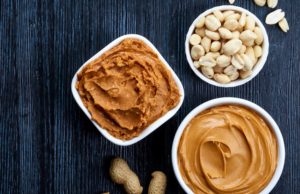Eating peanut butter every day can be a healthy choice, provided it fits into a balanced diet and is consumed in moderation. Here are some factors to consider:
Benefits of Daily Peanut Butter Consumption
- Nutrient-Rich: Peanut butter is a good source of protein, healthy fats, vitamins, and minerals. It can contribute to your daily intake of essential nutrients like vitamin E, magnesium, potassium, and vitamin B6.
- Heart Health: The monounsaturated and polyunsaturated fats in peanut butter are beneficial for heart health. Regular consumption can help lower LDL cholesterol levels and reduce the risk of heart disease.
- Satiety and Weight Management: The protein and fiber in peanut butter can help you feel full longer, potentially aiding in weight management by reducing overall calorie intake throughout the day.
- Muscle Repair and Growth: The protein content supports muscle repair and growth, making it a good addition to the diet of those who are physically active.
- Convenient and Versatile: Peanut butter is easy to incorporate into meals and snacks. It can be spread on whole-grain toast, added to smoothies, or used as a dip for fruits and vegetables.
Potential Drawbacks
- Calorie Dense: Peanut butter is high in calories, with about 190 calories per two-tablespoon serving. Overconsumption can lead to weight gain if not balanced with other food intake and physical activity.
- Added Ingredients: Some peanut butter brands add sugars, hydrogenated oils, and excess salt. These additives can negate some of the health benefits. Choosing natural or organic peanut butter without added ingredients is better.
- Allergy Considerations: For those with peanut allergies, even small amounts can trigger severe reactions. Alternative nut butters should be considered for these individuals.
- Aflatoxins: Although the risk is low due to quality control, peanuts can sometimes contain aflatoxins, harmful compounds produced by certain molds. Opting for brands with rigorous safety standards can mitigate this risk.
Recommendations for Daily Consumption
- Moderation: Stick to a serving size of about two tablespoons per day. This allows you to enjoy the benefits without excessive calorie intake.
- Balanced Diet: Ensure that peanut butter is part of a varied diet that includes plenty of fruits, vegetables, whole grains, and lean proteins. This helps provide a wide range of nutrients needed for overall health.
- Natural Varieties: Choose natural or organic peanut butter that contains just peanuts and perhaps a small amount of salt. This minimizes the intake of unnecessary sugars and unhealthy fats.
- Mindful Eating: Be mindful of how peanut butter fits into your overall daily calorie and nutrient goals. It’s easy to overconsume due to its delicious taste and creamy texture.
Conclusion
Eating peanut butter every day can be part of a healthy diet if you pay attention to portion sizes and choose high-quality, natural products. Its nutrient density, heart-healthy fats, and ability to promote satiety make it a valuable addition to your daily food intake. However, it’s important to balance peanut butter consumption with other nutritious foods and maintain an overall healthy lifestyle.


